This post is one in a series following six brewers collaborating to each make a small adjustment to a single recipe in order to improve it, then pass it along to the next brewer. We hope to learn more about the art of recipe creation as we see how other brewers approach the same recipe. The rest of the series can be found here.
Author: B. Crochet
Brew Day
The biggest change to my brew day process since I brewed Iteration 3 was using RO water for mash/sparge. I started with 12 gallons of RO and added 20g chalk and 5g gypsum. I heated my strike water to 168°F. Once at temperature, I transferred about 4.5 gallons of water to the mash tun. Usually, I preheat my mash tun, but neglected to do that. Thus started the long brew day I had ahead of me. I transferred water back and forth between my HLT and MT until I had a dough-in temperature of 168°F to offset my lack of preheating the tun. After mashing in, I hit my target of 154°F. Exactly. It was a pain to get it there, but once there, it was perfect. I let the mash rest for 60 minutes, stirring every 15 minutes or so.
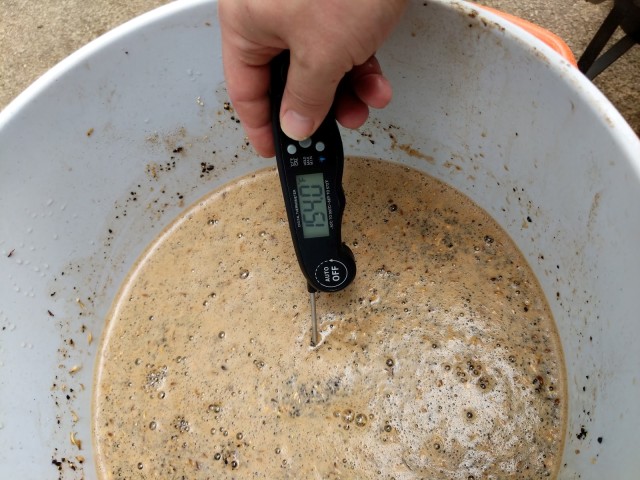
While the mash was going, I heated the HLT water to 200°F. After the 60 minute mash, I added about 3 gallons of 200°F water, and started a vorlauf. Then I began to collect the sweet wort. When the wort got to the level of my thermowell, I discovered another problem. I had changed the gaskets on my thermowell and it sprung a leak. A bad one. One that I couldn’t ignore. Thankfully, my wife happened by to give me a hand. She kept downward pressure on the thermowell, as this seem to keep it down to a tiny trickle so that I could step back and figure out what to do. Thankfully I still had the plugs that came with my kettle, so I decided to send the wort back into the MT so that I could just remove the thermowell and put the plug back in. This was a successful operation, and only lost a tiny bit of sweet wort.
I topped off the mash with a few more gallons of water, and finished with a total of 7.5 gallons of sweet wort. After undershooting the gravity of my last brew, I made sure the gravity was where it should be preboil. Calculations told me it was spot on, so I started the boil.
Once the wort was at a vigorous boil, I added the first hops of 0.87 oz. of 15% Nugget, and set my timers. Luckily, I was paying attention to the boil, and not just doing other things around the house. I ran out of propane. Ok. No biggie. I have another tank. So I paused my timers, hooked up the second tank, and when it got back to a boil, started the timers again. And wouldn’t you know, 15 minutes later, the second tank ran out. Sigh. Pause timers again, run to the hardware store, and do a quick tank exchange. I had it back to boiling within 10 minutes, but geez, what a pain.
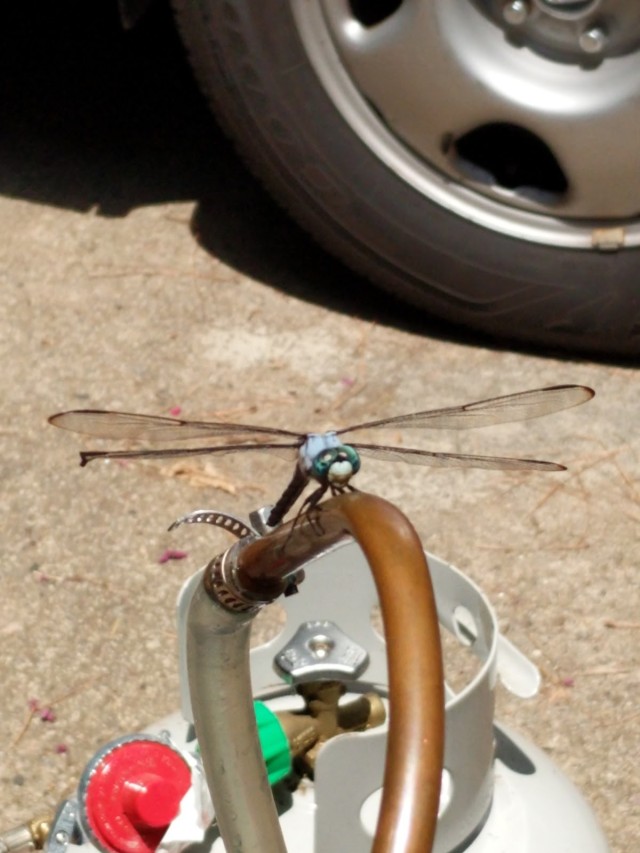
Boil achieved again, timers now resumed, I got down to 15 minutes remaining, and in goes the chiller. 5 more minutes, and in goes one teaspoon of Irish Moss. With 5 minutes to go in the boil, I added 1.3 oz of 7.8% Centennial.
The final volume of wort in the kettle was 5.75 gallons, and it finished at 16 brix. Success! I started a whirlpool and the chiller. Usually I just let the outflow from the chiller go, but this time I used a second hose to send it down my utility sink, which of course invited yet another place for something to go wrong. I didn’t secure the hose enough, and it sent hot water all over my laundry room floor. I was thankful for two reasons: 1) My laundry room is off of the garage and pretty much detached from the house, so not too much harm there; 2) It actually helped me to discover a leak from the utility sink faucet hose. But I digress.
I chilled the wort down to 80°F and couldn’t get it to go much lower. So I started to collect the wort into the fermenter. I collected about 5.25 gallons. I put a sanitized airlock on it, and left it in my fermentation room for a few hours at 66°F before I pitched the yeast. I increased my fermentation room to 68°F. Fermentation activity was observed 12 hours later.
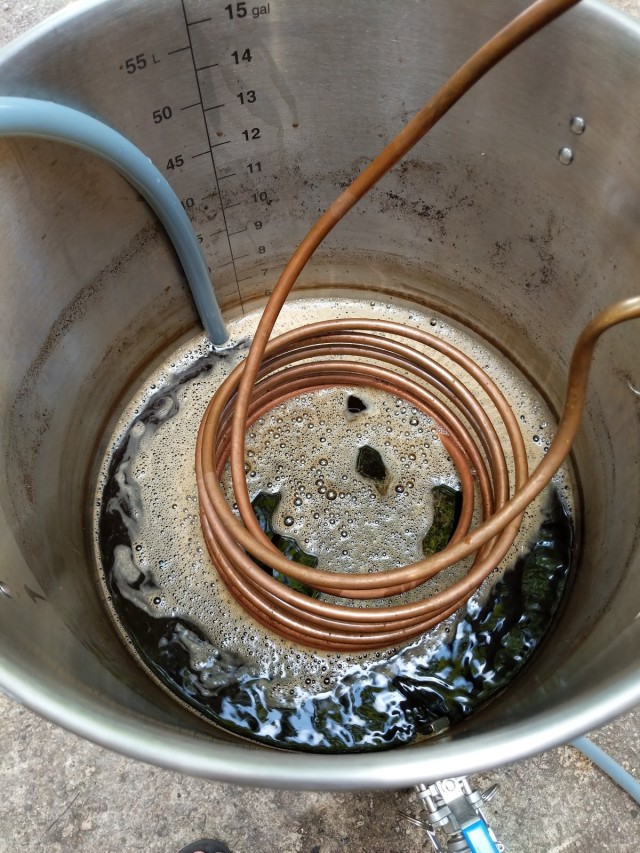
11 days later, I transferred to a 5 gallon corny. It finished at 1.023, for an apparent attenuation of 64%. It’s a little lower than desired, but not by much. It probably could have benefitted from a few days at 72°F.
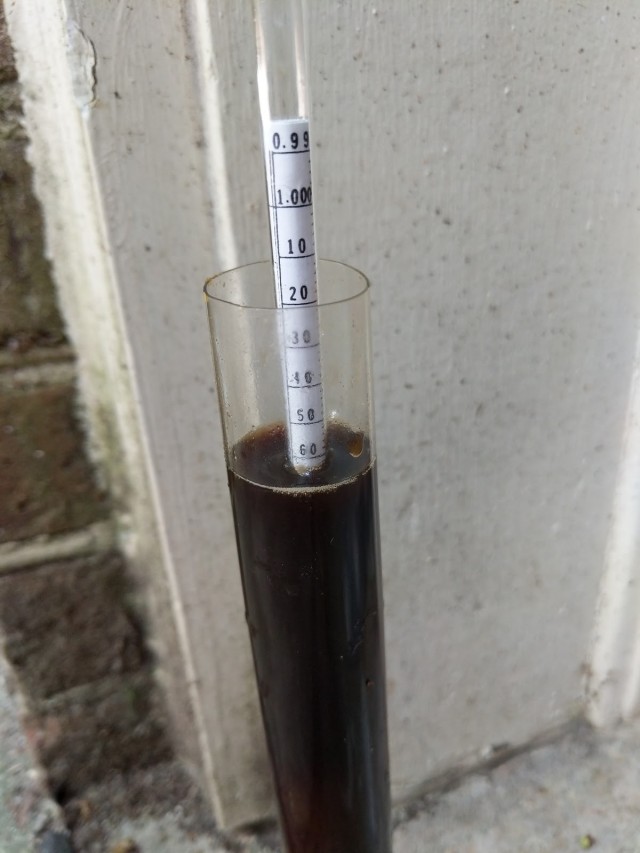
Recipe
My impression upon opening and pouring Iteration 8 was pleasant. Only a small head formed, with a brown to dark brown color. As expected, the aroma had coffee notes and chocolate. Color was dark brown. Definitely tasted roasted coffee flavors. There was an acidity there though, that was not pleasant or desired. I had my wife taste it as well to make sure that I wasn’t misperceiving it. At first I thought it might be some type of addition to the recipe, but once I looked at the recipe, I decided that wasn’t the case. I’m only speculating, but I think the issues with the previous iteration having too high of an OG/FG, it may have been due to the additional alcohol. I really don’t know, to be perfectly honest. But I didn’t think it was anything fundamentally wrong with the recipe.
With the perceived acidity, it was hard to truly judge what to change. It really overpowered the beer. So, I took a leap and decided to just try a more expressive yeast. I hadn’t used Denny’s Favorite 50 (Wyeast 1450) before, but I had read that it’s supposed to accentuate the malt without becoming cloying, which seemed like it would be a good fit for this stout, so I figured we’d give that a try. I ended up with the following recipe:
- Mashed at 154°F for 1 hour
-
- 68% 2-row
- 10.2% Victory
- 7.5% flaked barley
- 7.5% roasted barley
- 5.1% Pale chocolate
- 1.7% Chocolate (350°L)
- Boiled for 1 hr.
- 0.87 oz. Nugget (60 min.) at 15% AA (43.2 IBUs)
- 1.3 oz Centennial (5 min.) at 7.8% (6.7 IBUs)
- Pitched Wyeast 1450 (Denny’s Favorite 50)
- OG: 1.065
- FG: 1.023
- ABV: 5.5%
- Kegged, then force-carbonated with a carb-stone lid. Started at 4 PSI, then ramped up 2-3 PSI every couple of hours until reaching 12 PSI, then rested for 24 hours at 12 PSI.
- After force-carbing, bottled with a growler filling tube, then capped.
Tasting
The biggest differences I could detect from the previous iteration was the lack of that acidity. Color and carbonation levels were pretty much the same, but my iteration seemed to lack some head retention. There was definitely more expressive malt character, which was my goal in changing in the yeast. The mouthfeel is nice on both. The head was a nice brown color on both. The coffee and chocolate notes were still present in the aroma, and the roastiness in the flavor was still present.
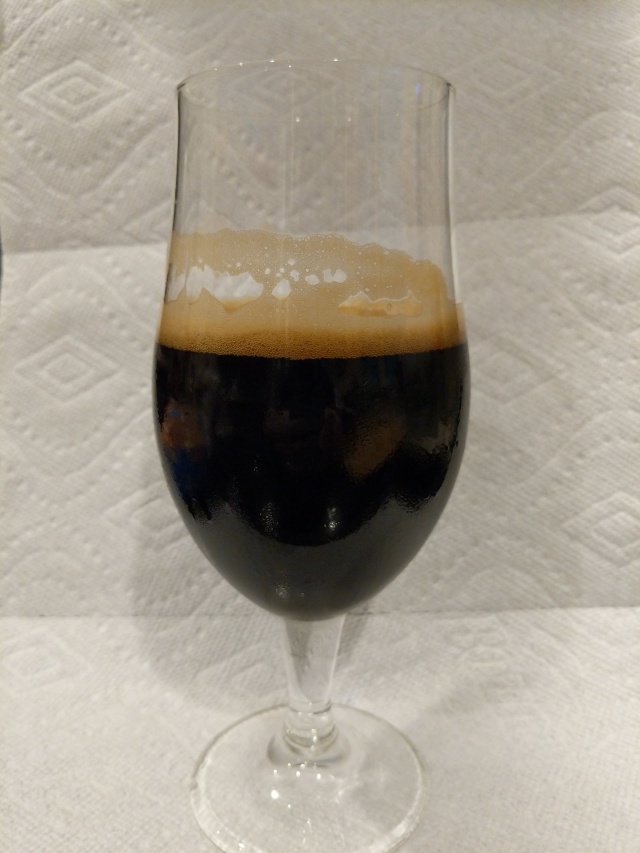
My next change would probably be to actually simplify the grain bill again. Perhaps remove the chocolate malt altogether, and add that percentage back to the base grain. Alternatively, I’d try a bit more IBUs from the bittering hop charge, to balance out the more expressive maltiness from the yeast.
Recipe Progression
| Iteration 1 | Iteration 2 | Iteration 3 | Iteration 4 | Iteration 5 | |
| Base Malt 2-row | 80% | 80% | 80% | 72.5% | 69.2% |
| Specialty Malt 1 | 10% Victory | 10% Victory | 5% Victory | 10.8% | 10.8% |
| Specialty Malt 2 | 5% Roasted Barley | 5% Roasted Barley | 10% Roasted Barley | 4.4% Roasted Barley | 7.8% Roasted Barley |
| Specialty Malt 3 | 5% Carafa III | 5% Chocolate Malt | 5 % Chocolate Malt | 4.4% Chocolate Malt | 4.4% Chocolate Malt |
| Specialty Malt 4 | None | None | None | 7.8% Flaked Barley | 7.8% Flaked Barley |
| Specialty Malt 5 | None | None | None | None | None |
| 60 min. hop | Nugget: 47.7 IBUs | Nugget: 42.5 IBUs | Nugget: 47.7 IBUs | Nugget: 41.2 IBUs | Nugget: 41.5 IBUs |
| 5 min. hop | Willamette: 3.6 IBUs | Willamette: 3.3 IBUs | Willamette: 2.9 IBUs | Willamette: 3 IBUs | Willamette: 3 IBUs |
| Yeast | US-05 | US-05 | US-05 | US-05 | US-05 |
| OG | 1.054 | 1.060 | 1.045 | 1.065 | 1.064 |
| FG | 1.010 | 1.016 | 1.005 | 10.20 | 1.020 |
| ABV | 5.8% | 5.8% | 5.25% | 5.9% | 5.8% |
| Iteration 6 | Iteration 7 | Iteration 8 | Iteration 9 | |
| Base Malt 2-row | 69.2% | 69.2% | 68% | 68% |
| Specialty Malt 1 | 10.8% Victory | 10.8% Victory | 10.2% Victory | 10.2% Victory |
| Specialty Malt 2 | 7.8% Roasted Barley | 7.8% Roasted Barley | 7.5% Roasted Barley | 7.5% Roasted Barley |
| Specialty Malt 3 | 4.4% Chocolate Malt | 4.4% Chocolate Malt | 1.7% Chocolate Malt | 1.7% Chocolate Malt |
| Specialty Malt 4 | 7.8% Flaked Barley | 7.8% Flaked Barley | 7.5% Flaked Barley | 7.5% Flaked Barley |
| Specialty Malt 5 | None | None | 5.1% Pale Chocolate | 5.1% Pale Chocolate |
| 60 min. hop | Nugget: 45 IBUs | Nugget: 44.3 IBUs | Nugget: 44.3 IBUs | Nugget: 43.2 IBUs |
| 5 min. hop | Willamette: 3.6 IBUs | Centennial: 6.2 IBUs | Centennial: 6.8 IBUs | Centennial: 6.7 IBUs |
| Yeast | White Labs Irish Ale Yeast (WLP004) | White Labs Irish Ale Yeast (WLP004) | White Labs Irish Ale Yeast (WLP004) | WYeast 1450 Denny’s Favorite 50 |
| OG | 1.065 | 1.064 | 1.075 | 1.065 |
| FG | 1.018 | 1.021 | 1.012 | 1.023 |
| ABV | 6.2% | 5.6% | 8.3% | 5.5% |

Pingback: Stout: Tasting Iterations 8 & 9 | brewublog
Pingback: Stout: Iteration 10 | brewublog
Pingback: Stout: Tasting Iterations 9 & 10 | brewublog